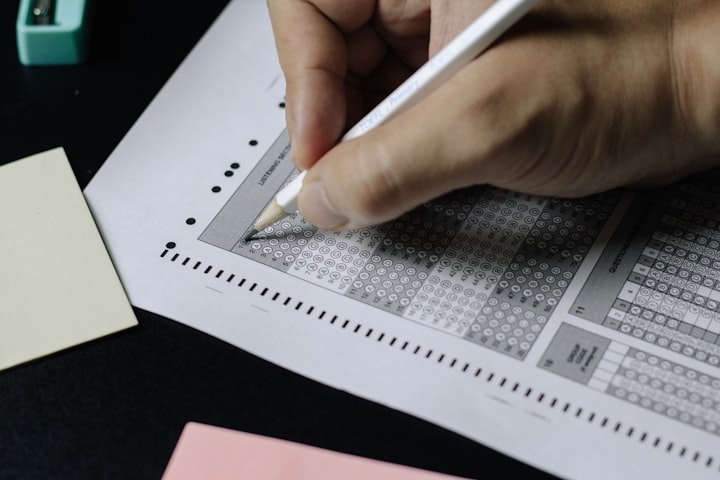10 Tips to Improve Your Learning Process for Exams
Maximizing Your Efficiency and Success

Studying for exams can be a daunting task, but with the right approach, it can be easy and fun. In this post, I am going to share with you 10 tips that will help you improve your learning process for exams. From studying in short bursts to breaking the material down into manageable chunks, these tips will help you maximize your learning potential and improve your exam performance.
So whether you are preparing for an upcoming college exam or a certification test, read on to learn how to improve your learning process for exams.
1. Understand the purpose of an exam
Before anything else, you need to understand the purpose of an exam. It's not just to test your knowledge; it's also to test your ability to apply that knowledge.
Once you've understood the purpose of an exam and the topics covered, you need to be familiar with the question types.
There are three question types: Multiple Choice, True/False, and In-Depth Questions.
2. Organize your study materials
Most students procrastinate before exams and this can have a lot of negative consequences. In this post, I'll list 10 tips to help you improve your learning process for exams.
3. Create a study schedule
Studying for exams is hard work, but it's important to make the process as smooth as possible. Here are 10 tips to help you make the most of your studying time:
1. Set realistic goals
Don't try to cram for exams by studying for days on end without taking a break. This won't help you at all and you'll only end up feeling exhausted and resentful. Instead, set realistic goals for how much studying you'll do each day and break it up into manageable chunks.
2. Take a break
If you start feeling overwhelmed or like you can't focus, take a break. Go for a walk, watch a movie, or read a book. You'll feel better when you come back and your mind will be more receptive to studying.
3. Get organized
Having a study area where you can put all your materials in one place is helpful. This way, you won't have to search through piles of papers to find what you're looking for. It's also helpful to have a timetable of the exams so you know when the material is due.
4. Stick to a routine
Studying for exams is tough, but it's even harder if you don't have a regular routine. Study in the same place, at the same time, every day. This will help you to focus and avoid feeling overwhelmed.
5. Don't cram
Cramming only makes the process harder. It's better to break up the studying process into small manageable chunks and focus on one topic at a time.
6. Take a break
Whenever you reach a difficult part of the material, take a break. This will allow your mind to clear and you'll be ready to resume studying when you come back.
7. Get help
If you find that you're struggling to keep up with the material, don't be afraid to ask for help. There are many resources available on the internet, such as study guides and flashcards.
8. Take practice exams
Taking practice exams is a great way to prepare for the real thing. This will allow you to see the material in a realistic setting and to identify any areas that you need to work on.
9. Talk to a tutor
If you find that you're struggling with the material, talking to a tutor may be a good option. Tutors are available 24/7 and can help you to understand the material in a more in-depth way.
4. Set a goal for each exam section
For example, if you're studying for an English exam, your goal might be to improve your vocabulary by 10% each week. If you're studying for a maths exam, your goal might be to understand the concepts more deeply by 20% each week.
If you find that you're slipping in your learning, it's important to track your progress and make a change to your studying plan. This will help you to improve your results.
5. Take practice exams
One of the best ways to improve your learning process is by taking practice exams. This will not only help you to become more familiar with the material, but it will also help you to identify any areas in which you need to improve.
Another way to improve your learning process is by using flashcards. This will help you to remember the information more easily and it can also be used to help you to review the material at any time.
Finally, it's important to have a good study schedule. Doing too much at once can actually hinder your learning process. Instead, try to break the material down into smaller chunks and work on it one step at a time.
By following these tips, you will be on your way to becoming a successful student.
6. Utilize flashcards and other learning tools
There is no doubt that learning is essential for exams. However, the process of learning can be time-consuming and often difficult. In order to make studying more efficient, use flashcards and other learning tools.
Flashcards are a great way to remember material. They can be used as a study tool in class, as a way to review information before an exam, or as a way to help you remember important facts for a test.
Other learning tools include study journals, flashcards with definitions, and practice problems. By using these tools, you can make learning more efficient and easier.
7. Stay positive during exams
It can be really tough during exams to keep your spirits up. You might find yourself feeling really down, confused, and stressed. But remember, you're not alone. Lots of students feel this way. And while it might be really hard, there are things you can do to make the process a little bit easier.
Here are 10 tips to help improve your learning process for exams:
1. Set realistic goals. Don't try to cram everything into one night or one weekend. You'll only end up feeling overwhelmed and stressed. Make sure to break up the studying into smaller chunks and set mini goals for yourself.
2. Stick to a study schedule. You might find it helpful to set a time each day where you'll study for an hour or so. This way, you'll know when the timer goes off and you can stop.
3. Get organized. If you can, try to study in a quiet room with minimal distractions. This will help you focus.
4. Make a study guide. This will help you remember the information you've learned and also help you organize your thoughts. This will help you remember the information you've learned and also help you organize your thoughts.
5. Take practice exams. This will help you get used to the format of the real exam. This will help you get used to the format of the real exam.
6. Get help from a tutor. This is a great way to get extra help with your studies and also to get feedback on your test performance.
7. Stay positive. This may seem like a small thing, but it can make a big difference. When you're down, tell yourself that you can do this. And remember, there are always people who are going through the same thing as you. There's support out there.
8. Get a good night's sleep. This is key. When you're well-rested, you're less likely to feel stressed and more likely to be able to focus.
9. Avoid caffeine and sugar. These things can make you feeling jittery and anxious.
10. Take a break. Sometimes all you need is a little time away from the studying to clear your head and start fresh.
8. Make use of study aids
There are many different types of study aids that can be used to help you with your exams. From flashcards to apps to websites, make sure to find the right tool for you.
Some things to keep in mind when selecting a study aid are:
-The material should be engaging so that you will want to continue using it
-The material should be tailored to your exam
-The material should be easy to use
-The material should be available at a reasonable cost
9. Use positive visualization techniques
Visualization is a powerful tool that can be used to improve learning processes. It can also be used to improve test performance.
There are a few different ways to use visualization to improve learning. One way is to use it as a tool to increase focus. You can use visualization to increase your concentration and help you to focus on the task at hand.
Another way to use visualization is to help you to remember information. You can use visualization to help you to remember the information you have learned.
Finally, visualization can also be used to help you to learn new information. You can use visualization to help you to learn new information more quickly.
10. Take time for reflection after each exam
One of the best ways to do this is to keep a study diary. This will help you track what you studied, how much you studied, and what areas you found most difficult.
You can also use flashcards to help you remember key information.
It's also important to take breaks. Make sure to take at least 20 minutes after each exam to relax and reflect on your performance.
I hope you enjoyed my blog post about how to improve your learning process for exams. exams can be a huge challenge, but with a little preparation and hard work, you can overcome them.
I have highlighted 10 tips that will help you learn faster and retain more information. I hope that you find these tips helpful and that you can put them to use to improve your learning process for exams.
About the Creator
Radhakrishnan
I am a passionate and dedicated writer. I specialize in creating compelling content that is both engaging and informative.My writing skills include crafting blog posts, articles, website content, product reviews, and more.






Comments
There are no comments for this story
Be the first to respond and start the conversation.